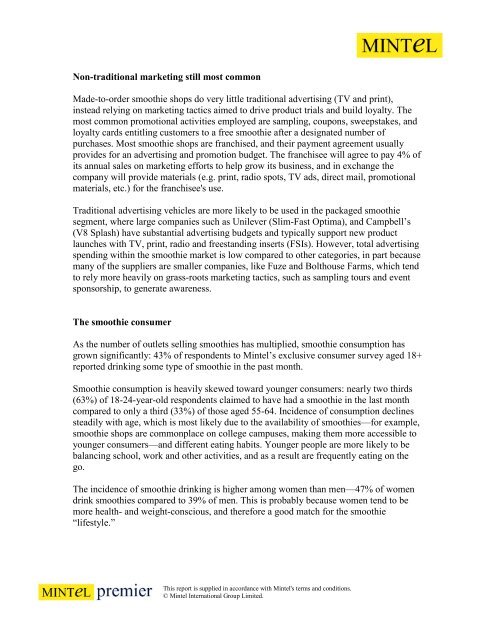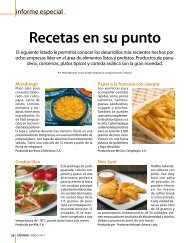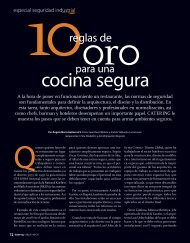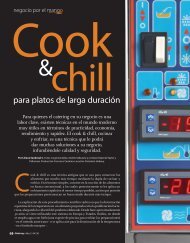Smoothies - US - November 2005 Executive ... - Catering.com.co
Smoothies - US - November 2005 Executive ... - Catering.com.co
Smoothies - US - November 2005 Executive ... - Catering.com.co
You also want an ePaper? Increase the reach of your titles
YUMPU automatically turns print PDFs into web optimized ePapers that Google loves.
Non-traditional marketing still most <strong><strong>co</strong>m</strong>monMade-to-order smoothie shops do very little traditional advertising (TV and print),instead relying on marketing tactics aimed to drive product trials and build loyalty. Themost <strong><strong>co</strong>m</strong>mon promotional activities employed are sampling, <strong>co</strong>upons, sweepstakes, andloyalty cards entitling customers to a free smoothie after a designated number ofpurchases. Most smoothie shops are franchised, and their payment agreement usuallyprovides for an advertising and promotion budget. The franchisee will agree to pay 4% ofits annual sales on marketing efforts to help grow its business, and in exchange the<strong><strong>co</strong>m</strong>pany will provide materials (e.g. print, radio spots, TV ads, direct mail, promotionalmaterials, etc.) for the franchisee's use.Traditional advertising vehicles are more likely to be used in the packaged smoothiesegment, where large <strong><strong>co</strong>m</strong>panies such as Unilever (Slim-Fast Optima), and Campbell’s(V8 Splash) have substantial advertising budgets and typically support new productlaunches with TV, print, radio and freestanding inserts (FSIs). However, total advertisingspending within the smoothie market is low <strong><strong>co</strong>m</strong>pared to other categories, in part becausemany of the suppliers are smaller <strong><strong>co</strong>m</strong>panies, like Fuze and Bolthouse Farms, which tendto rely more heavily on grass-roots marketing tactics, such as sampling tours and eventsponsorship, to generate awareness.The smoothie <strong>co</strong>nsumerAs the number of outlets selling smoothies has multiplied, smoothie <strong>co</strong>nsumption hasgrown significantly: 43% of respondents to Mintel’s exclusive <strong>co</strong>nsumer survey aged 18+reported drinking some type of smoothie in the past month.Smoothie <strong>co</strong>nsumption is heavily skewed toward younger <strong>co</strong>nsumers: nearly two thirds(63%) of 18-24-year-old respondents claimed to have had a smoothie in the last month<strong><strong>co</strong>m</strong>pared to only a third (33%) of those aged 55-64. Incidence of <strong>co</strong>nsumption declinessteadily with age, which is most likely due to the availability of smoothies—for example,smoothie shops are <strong><strong>co</strong>m</strong>monplace on <strong>co</strong>llege campuses, making them more accessible toyounger <strong>co</strong>nsumers—and different eating habits. Younger people are more likely to bebalancing school, work and other activities, and as a result are frequently eating on thego.The incidence of smoothie drinking is higher among women than men—47% of womendrink smoothies <strong><strong>co</strong>m</strong>pared to 39% of men. This is probably because women tend to bemore health- and weight-<strong>co</strong>nscious, and therefore a good match for the smoothie“lifestyle.”This report is supplied in ac<strong>co</strong>rdance with Mintel's terms and <strong>co</strong>nditions.© Mintel International Group Limited.
















